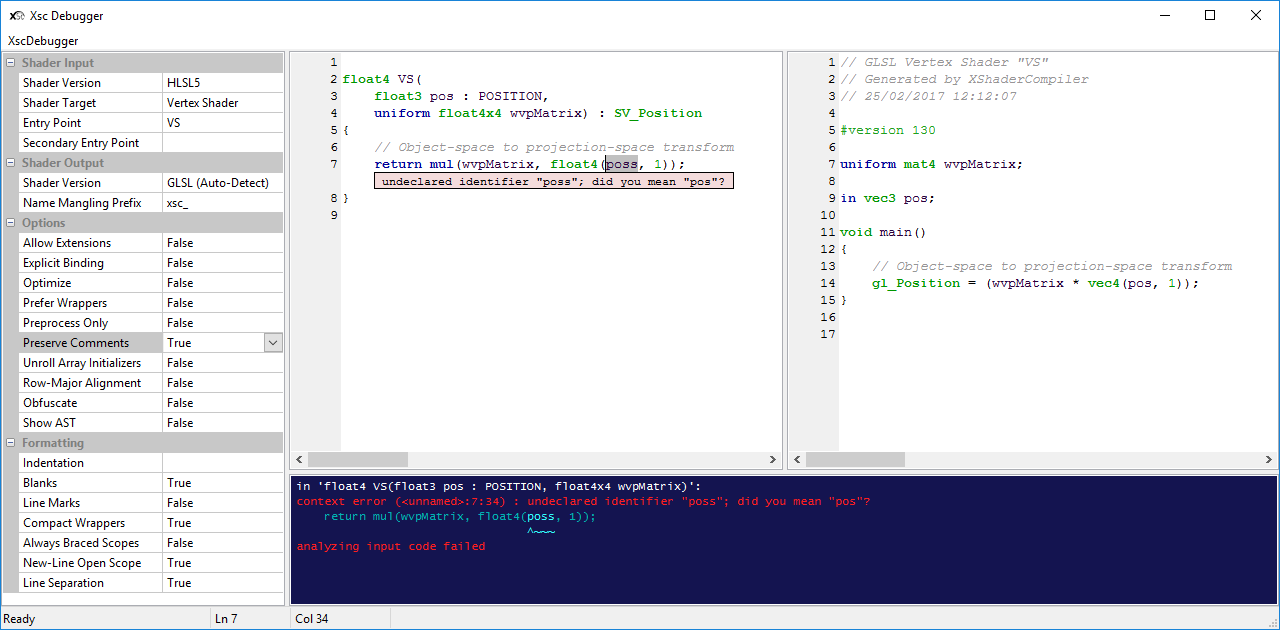
Licence BSD à 3 clauses
Version : 0.11 Alpha ( Ne pas utiliser dans le code de production ! )
Consultez le fichier TODO.md pour plus d’informations.
| Fonctionnalité | Progrès | Remarques |
|---|---|---|
| Shader de sommet | ~80% | Il reste encore peu de fonctionnalités linguistiques |
| Shader de contrôle de tessellation | ~20% | Traduction d'InputPatch et de patch-constant-function en cours |
| Shader d'évaluation de tessellation | ~20% | Traduction d'OutputPatch en cours |
| Shader de géométrie | ~60% | La génération du code est incomplète |
| Shader de fragments | ~80% | Il reste encore peu de fonctionnalités linguistiques |
| Calculer le shader | ~80% | Il reste encore peu de fonctionnalités linguistiques |
La ligne de commande suivante traduit le fichier « Example.hlsl » avec le point d'entrée du vertex shader « VS » et le point d'entrée du fragment shader « PS » :
xsc -E VS -T vert Example.hlsl -E PS -T frag Example.hlsl
Le résultat est deux fichiers de shader GLSL : "Example.VS.vert" et "Example.PS.frag".
# include < Xsc/Xsc.h >
# include < fstream >
# include < iostream >
int main ()
{
// Input file stream (use std::stringstream for in-code shaders).
auto inputStream = std::make_shared<std::ifstream>( " Example.hlsl " );
// Output file stream (GLSL vertex shader)
std::ofstream outputStream ( " Example.VS.vert " );
// Fill the shader input descriptor structure
Xsc::ShaderInput inputDesc;
inputDesc. sourceCode = inputStream;
inputDesc. shaderVersion = Xsc::InputShaderVersion::HLSL5;
inputDesc. entryPoint = " VS " ;
inputDesc. shaderTarget = Xsc::ShaderTarget::VertexShader;
// Fill the shader output descriptor structure
// Use outputDesc.options, outputDesc.formatting, and outputDesc.nameMangling for more settings
Xsc::ShaderOutput outputDesc;
outputDesc. sourceCode = &outputStream;
// Optional output log (can also be a custom class)
Xsc::StdLog log ;
// Optional shader reflection data (for shader code feedback)
Xsc::Reflection::ReflectionData reflectData;
// Translate HLSL code into GLSL
try
{
bool result = Xsc::CompileShader (inputDesc, outputDesc, & log , &reflectData);
}
catch ( const std:: exception & e)
{
std::cerr << e. what () << std::endl;
}
return 0 ;
} using System ;
using System . IO ;
namespace Example
{
class Program
{
static void Main ( )
{
// Create instance of the XShaderCompiler
var compiler = new XscCompiler ( ) ;
// Fill the shader input descriptor structure
var inputDesc = new XscCompiler . ShaderInput ( ) ;
inputDesc . SourceCode = File . ReadAllText ( "Example.hlsl" ) ;
inputDesc . ShaderVersion = XscCompiler . InputShaderVersion . HLSL5 ;
inputDesc . EntryPoint = "VS" ;
inputDesc . Target = XscCompiler . ShaderTarget . VertexShader ;
// Fill the shader output descriptor structure
// Use outputDesc.Options, outputDesc.Formatting, and outputDesc.MameMangling for more settings
var outputDesc = new XscCompiler . ShaderOutput ( ) ;
// Optional output log (can also be a custom class)
var log = compiler . StandardLog ;
// Optional shader reflection data (for shader code feedback)
var reflectData = new XscCompiler . ReflectionData ( ) ;
// Translate HLSL code into GLSL
try
{
bool result = compiler . CompileShader ( inputDesc , outputDesc , log , reflectData ) ;
if ( result )
{
// Write output shader code
File . WriteAllText ( "Example.VS.vert" , outputDesc . SourceCode ) ;
}
}
catch ( Exception e )
{
Console . WriteLine ( e ) ;
}
}
}
} Un débogueur en temps réel avec interface utilisateur est fourni. Bien que ce débogueur soit principalement utilisé pour le développement du compilateur lui-même, il peut également être utilisé pour un aperçu rapide de la traduction, afin de voir comment les constructions du langage sont compilées de manière croisée.
Exemple de débogueur en temps réel (nécessite wxWidgets 3.1.0 ou version ultérieure) :

Voici un bref aperçu des différences de haut niveau entre HLSL et GLSL, que XShaderCompiler est capable de traduire correctement :
| Fonctionnalité | HLSL | GLSL |
|---|---|---|
| Séparation des textures et des samplers | Oui | Uniquement pour Vulkan |
| Héritage de structures | Oui | Non |
| Structures imbriquées | Oui | Non |
| Structures anonymes | Oui | Non |
| Fonctions des membres de la structure | Oui | Non |
| Paramètres par défaut | Oui | Non |
| Intrinsèques orientés objet | Oui | Non |
| Points d'entrée multiples | Oui | Non |
| Alias de type | Oui | Non |
| Valeurs L de la sémantique d'entrée | Oui | Non |
| Conversion de type implicite | Extensif | Limité |